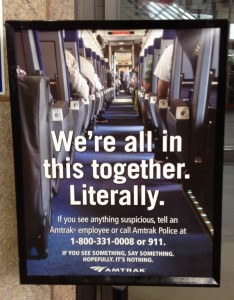Has literally lost its meaning, and with it its raison d’etre? As Fowler summed it up in his eloquent way: “We have come to such a pass with this emphasizer that where the truth would require us to insert with a strong expression ‘not literally, of course, but in a manner of speaking’, we do not hesitate to insert the very word that we ought to be at pains to repudiate; cf. VERITABLE. Such false coin makes honest traffic in words impossible.”
Take this Amtrak sign that I saw on a recent rail journey.
What is the word literally even supposed to mean in this context? That “we” (who are we?) are all on a train together? If not a train, what is the ‘this’ we are all in together? If it’s supposed to mean that we as a nation (or the world) are all threatened by terrorism, then that’s not technically (literally) correct, since the world’s population includes those who are threatening us – who are presumably not ‘in this’ with the rest of us. There is nothing literal in this very abstract statement.
Literally, which means the opposite of figuratively, has been hijacked and is now more widely used (in fact, over-used) as an intensifier, for emphatic effect. It often masquerades as its own antonym when it’s tagged to exaggerated or fantastic claims. “I literally died of embarrassment”; “We were literally glued to our seats”.
And more recently – as in the signage above – it has assumed a more lofty role, not as an adverb but as a speech-marker. Beginning or ending a sentence – or even standing alone, stoically and self-importantly – it’s setting the stage for what’s to follow, or taking a bow for what has just been said. “Listen to this: pay attention to what I’ve just said/I’m about to say. It’s important.”
Chris Traeger, a fictional character in NBC’s Parks and Recreation show, is literally inclined.
http://www.youtube.com/watch?v=_Xjka07o1-0

